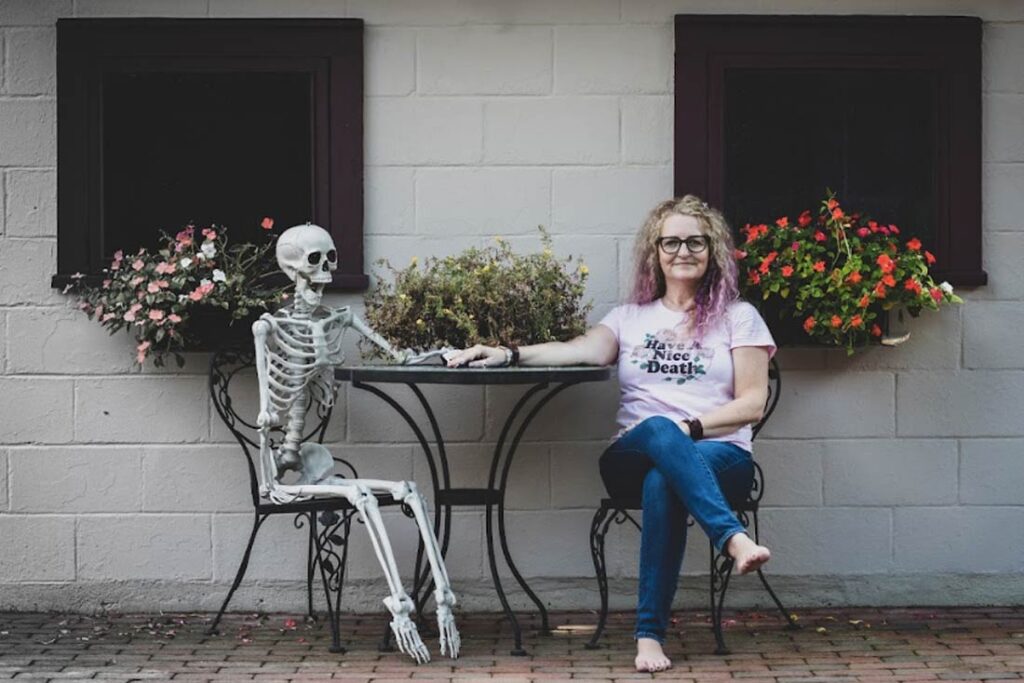When Amy Pickard’s mother died suddenly in 2012, she was understandably grief-stricken. But she also felt frustrated and overwhelmed, since her mother didn’t plan ahead for her death.
“I would have given anything to talk to my mom just one more time, but it wasn’t to hear her tell me she loved me; I needed her to tell me the friggin’ Wi-Fi password!” Pickard says.
Since her mother lived far away, Pickard didn’t know what bills needed to be paid or what to do with her mother’s now-deceased body.
“I just said, can you put her [body] on ice? Because I have no idea what is going on,” Pickard recalls. In an effort to normalize death and create a death-positive movement, Pickard teaches people how to throw a death party and add some humor to the inevitable and often daunting end-of-life duties.
Dealing with uncomfortable death duties
Pickard refers to all of the different decisions that need to be made and tasks that need to be completed after someone dies as “death duties.” She says these duties are “the hellscape of details forced upon a grieving loved one after their person dies.” This includes responsibilities such as cleaning their house and sorting their belongings, making funeral arrangements, settling their finances and closing their estate.
After her horrible experience with her mother’s death duties, Pickard wanted to help others avoid the same issues. “I was preaching the gospel of advanced planning to my friends,” she says. Surprised at how her friends took to the lessons, Pickard thought, “I have a message here. And it’s landing.”
In 2014, she created a long list of questions related to when someone dies. The list was a booklet called Departure File, which she still sells today. She included, “all the minute, everyday things that came up that I had no answer to, like ‘Do you have a storage space?’”
“Good To Go!” death parties are changing the narrative
Pickard realized most people think of death and dying as morbid and creepy, so they don’t like to talk about it. She also knew most people would probably not want to answer the questions in the Departure File, so she decided to create a party where everyone filled out the answers.
“I thought, ‘I’m a good communicator, I’m an extrovert and I have a sense of humor, so why not have a party?’” she says.
During the parties, Pickard tapped into her sense of humor by creating death-themed soundtracks with songs like “Another One Bites the Dust” and “Stairway to Heaven.” She also had everyone bring a potluck dish based on the recipe of a loved one.
She didn’t have a business plan when she started; instead, she learned as she went along and as her business evolved. Her parties are now referred to as “Good To Go!” parties, though guests have also described them as “Death Tupperware Parties” or “Fete du Mort” shindigs.
People who attended the initial parties “were blown away by it—all of us felt a beautiful kind of electricity in the room,” Pickard recalls, noting that no one else was hosting these types of events. “It is unbelievable how important this is, and how in denial our entire society is over the one absolute positive thing that we know with 100% certainty is going to happen,” she says.
Normalizing the death-positive movement
In a bid to overturn this cultural thinking, Pickard considers herself to be part of the death-positive movement—a way of thinking that encourages people to have end-of-life celebrations and speak openly about death, dying and corpses.
The modern-day concept of the death-positive movement dates back to the 1970s, but the death-positive movement was further popularized in 2011 by Caitlin Doughty, a mortician who believes people should change their perceptions about death. On her website, The Order of the Good Death, Doughty says death should be a part of your life. “Accepting that death itself is natural, but the death anxiety and terror of modern culture are not,” Doughty states on her website.
When Pickard’s father died, the experience was opposite that of her mother’s death. Pickard attributes that to the fact that he filled out the Departure File and talked openly with her about advanced planning. When she first created the Departure File, she wanted to help others and didn’t consider how it could one day help her. Like her mother, her father died suddenly. When he was intubated in the hospital, she gave a copy of his Departure File that included his advanced care directive to the staff. Their response was, “No one ever does this. This is amazing.”
Before Pickard’s father passed away, she said to him, “You know that everything is taken care of.” She says the look of peace on his face in response brought her comfort. It was at that moment she understood that advanced planning also brings peace to a person before they die.
“It was such a weird, ironic moment that the company that I created for others actually helped me and helped my grief,” she says. “With [my dad’s] instruction, I felt empowered. I felt I was honoring him.” The directions he provided also eliminated any uncertainty she may have faced making decisions about duties related to his death.
Planning for death is planning your life
Even though “Good To Go!” parties are humorous and lighthearted, there are still times, understandably, when people are grieving. Pickard handles these situations by offering a tissue and trying to help them understand that, “when you plan for your death, it’s actually planning your life.”
She explains that people prepare for natural disasters by stocking up on candles and getting a generator, but they don’t plan for their death. “We spend more time building a burrito than we do thinking about what we want to happen when we die,” she says. Advanced planning is a way of letting people know how you want to be remembered, she adds.
Pickard recently expanded her business to help people declutter their homes while simultaneously creating advanced planning regarding their material things. She refers to this task as legacy organizing.
“I am helping people organize their homes for their death,” she says. She explains that her services are similar to that of a “death concierge.” She says, “I encourage people to clean out their places with their families. And that way, you make new memories. It’s actually fun.”
This lighthearted approach to death and advanced planning underscores Pickard’s mission with “Good To Go!” parties. “I’m not a doctor; I’m not a lawyer. I am just literally a girl that’s lived through grief and wants to help other people get through it too.”
Photo by Bobby Tewksbury










